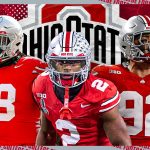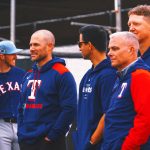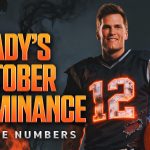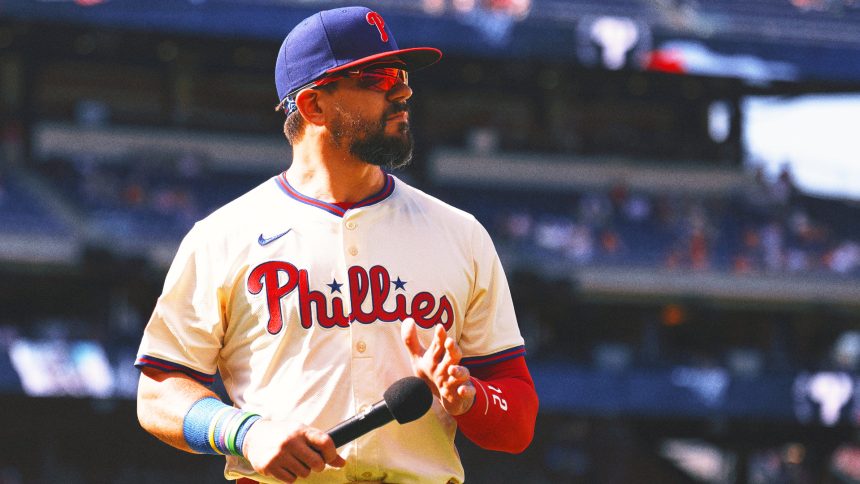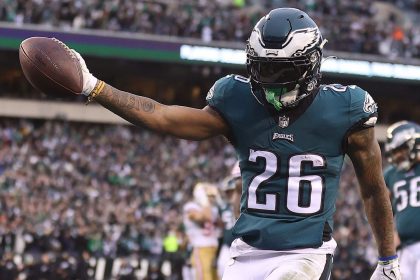If you want to find the heart and soul of a Major League Baseball team, start with the “mic guy” at the front of the bus.
When a team lands in a new city, it is often the task of one dedicated player to play emcee on the ride to the hotel. The goal is to keep things light and loose over the course of a long season, and there are no strict guidelines or topics for the man with the microphone.
“It can be about anything – where we’re going, who we’re playing, what we did, why we stink, someone messed up in a funny way,” Phillies slugger Kyle Schwarber explained.
The only real rule?
“You have to try to entertain the group,” said Dodgers mic guy Miguel Rojas. “You’re not a good mic guy if you’re just talking with your ego and saying stuff about yourself.”
It is a role fit for a team leader. You need some feel and an understanding of the temperature in the room. You have to be funny, but not a clown. You have to be respected, but you can’t take yourself too seriously. You need to be comfortable ribbing teammates — and yourself. Self-deprecation and humor are welcomed, perhaps even required, especially for a team in a funk.
ADVERTISEMENT
Sometimes, the production can go off the rails. But it takes a certain personality and fearlessness to stand there in the first place.
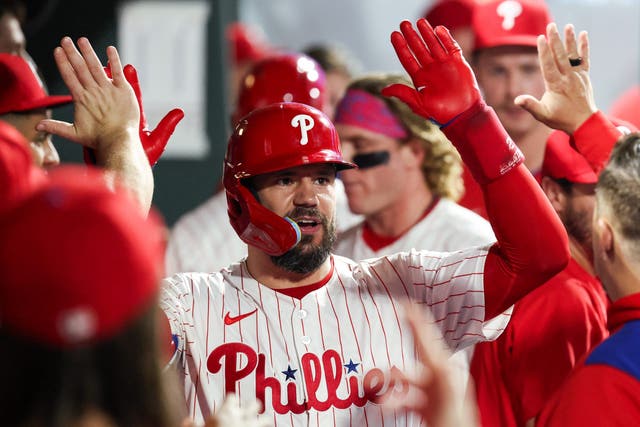
Along with being an All-Star slugger, Kyle Schwarber is also the ‘mic guy’ for the Phillies. (Photo by Isaiah Vazquez/Getty Images)
“Half of it is spitting out crap,” Schwarber said. “Half of it is not even entertaining. You’re trying to think of stuff to make people laugh and nothing’s really happening. Like, yeah, we had a great series but nothing really funny happened. So then I just bury myself most of the time.
“That’s how it goes. I’m not very good at it. There’s a few rare times that I’ll have the whole bus laughing, which is fun. But I’m sure half the time everyone’s sick and tired of hearing my s—.”
They are not.
In fact, Schwarber is beloved in the clubhouse for his affable, approachable nature and style of leadership, which makes the designated hitter the perfect fit to also be the designated mic guy.
“He’s a guy that’s really good at making fun of himself, which makes it a little easier to talk to him,” said Phillies rookie Otto Kemp. “He’s a perfectionist, but no ego. He kind of puts that aside and is a guy you can go up to at any point and ask about whatever. That’s special with a guy that’s been in the league as long as he has.”
‘He just brings us all together’
On the field, Schwarber’s value is measurable and significant: He led the National League with 56 home runs and all of MLB with 132 RBI in a career year.
Off the field, it is immeasurable yet maybe just as significant, from the bus to the batting cage, from his work in the community with Schwarber’s Neighborhood Heroes to his influence in the clubhouse with the team’s younger players.
Take Kemp, for instance, an undrafted Division II prospect out of Point Loma Nazarene University who made his big-league debut on June 7.
He did not know many players on the roster before the Phillies called him up, and he wanted to make a good first impression. He did not want to step on any toes. So, in his first couple weeks up, he tried to get his work done early before the rest of his teammates.
Well, most of them.
Schwarber, as Kemp would come to find out, “lives in the cage.” That provided him time to pick Schwarber’s brain.
“Just having that time to shoot the s— with him and bounce ideas back and forth and kind of get to know him a little more, what makes him who he is. That was a cool little thing for the first couple weeks when I was getting used to life up here,” Kemp said. “He helped out quite a bit.”
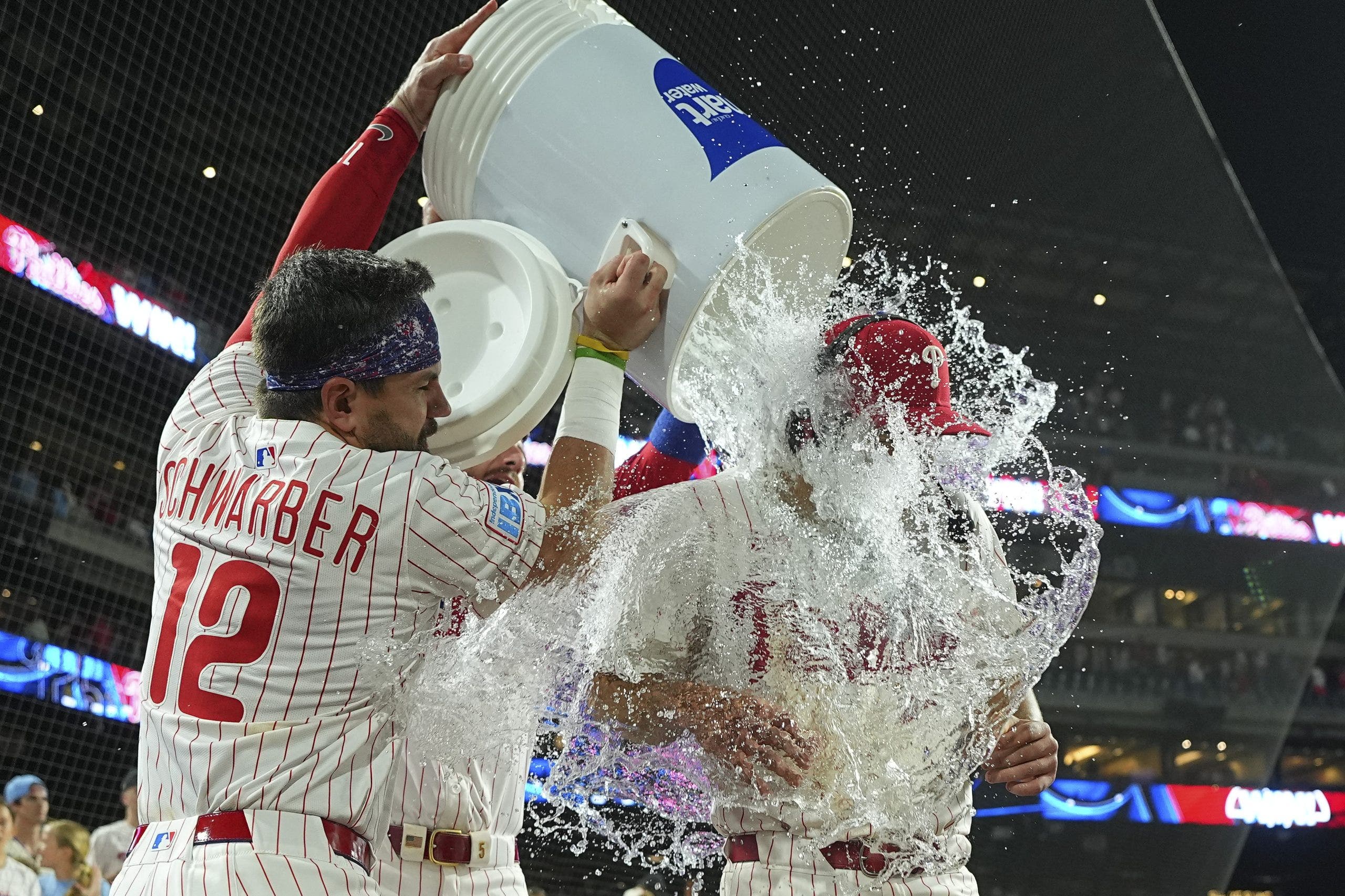
Kyle Schwarber giving Otto Kemp a celebratory bath earlier this season. (Photo by Mitchell Leff/Getty Images)
Weston Wilson, a 2016 17th-round pick who signed a minor league free-agent deal with the Phillies in 2023 and made his big-league debut later that year, had a similar experience with Schwarber two years ago.
“He just was one of those leaders you looked up to right away,” Wilson said. “Very welcoming, didn’t treat guys that had no service time differently than he treated guys with service time, so I respected that. I just think he’s the same guy every time, whether he’s doing good or bad, always encouraging others.”
Making teammates feel comfortable, Schwarber believes, is the most important trait to a winning culture. But it can’t be forced. He’s not sitting in his hotel room before a game trying to plan out which player he’s going to pull aside for a chat.
“It just happens,” Schwarber explained. “Being able to be approachable and being able to have good listening capabilities is also more important than just being able to spew it out. You can talk, talk, talk, talk, talk, and it might not click. But also, if someone’s got something, you want them to feel like they’re getting whatever they have to say off their mind, whatever it is. That might be way more valuable than you talking.”
Schwarber possesses a distinctive ability to impact players at all different points of their careers — mainly because he can relate, wherever they happen to be.
After a promising debut season with the Cubs at 22 years old, Schwarber famously tore his ACL and LCL and severely sprained his ankle in the second game of his second big-league season. The Cubs announced that he would be out for the year. Schwarber tweeted two days after the collision that it was “a test of character.”
Six months later, against all odds, he etched his place in Chicago lore when he returned, miraculously, for the World Series and went 7-for-17 in the Fall Classic to help end the Cubs’ 108-year curse. But four years later, an unceremonious departure awaited. The Cubs weren’t interested in holding onto the past when they non-tendered Schwarber after a down year in the COVID-shortened 2020 season.
Now, that experience is just part of his story, a moment that makes him even more relatable to those whose big-league journeys are either just beginning or at a crossroads.
“If you’re struggling, you’re worried about being sent down, I’ve been there,” Schwarber said. “Feel like you might get non-tendered? Been there.
“To experience it and come out on the other side, you just know there can be a light at the end of the tunnel. You have to keep fighting, keep pushing forward.”
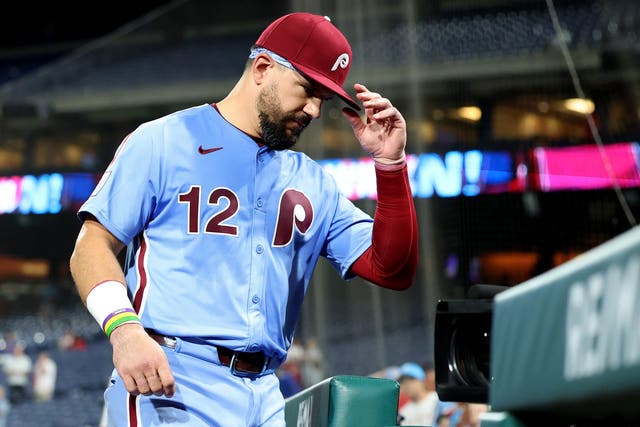
Kyle Schwarber rather let his play do the talking – expect when he is on the mic. (Photo by Emilee Chinn/Getty Images)
It’s easy to remain upbeat in a season that will end with MVP votes, as Schwarber’s almost certainly will this year. It’s not as easy when you’re hitting under .200 for a season, as Schwarber was two years ago.
But back then, Wilson saw the same guy he sees now.
“A lot of it has to do with the type of person you are away from baseball,” Wilson said. “He’s always leading, always treating people the same way.”
Schwarber cringes a bit at the “leader” label, mainly because he’s not doing anything beyond being himself.
“It’s a compliment, don’t get me wrong,” Schwarber said. “But I’m not a guy who likes to compliment myself.”
That’s fine; his teammates can do it for him.
“When we go into a new city, not all teams go out to dinner with each other,” said Garrett Stubbs, whose arrival in Philadelphia coincided with Schwarber’s in 2022. “But he seems to be the guy that continuously puts those dinners together — and not just financially paying for it but actually getting the guys going out to dinner together, hanging out outside the baseball field.”
More than anything, it’s Schwarber’s approachability that sets him apart. That ability spans age, race, language, background and tenure. Panama native Edmundo Sosa described his time with the Phillies to me as the “best four years of his life in baseball,” and it started with how he was treated by Schwarber and the established players in the locker room when Philadelphia acquired him from St. Louis at the 2022 deadline.
“He is a real leader,” Sosa said. “I say that because outside the field, inside the field, he takes care of everybody. Young guys, [veteran] guys, he tries to get everybody on the same page, staying together. He’s funny sometimes, but when it’s serious, it’s really serious.”
Added Kemp: “He just makes it less stressful, a little more comfortable.”
It’s possible that comfort has helped production.
What makes the Phillies feared this October is their elite rotation and the bats of Schwarber, Harper and NL batting champ Trea Turner. But they’ve had that before. What set them apart in 2025, helping them accumulate more wins than they’ve had in any season since 2011, is the supporting cast.
Among that group is Kemp, who provided a boost for the club as it dealt with injuries, logging time at four different positions. Sosa, meanwhile, played five different positions while hitting above league average in one of the best seasons of his career.
At the deadline, the Phillies’ new additions assimilated swiftly, playing some of their best baseball upon joining the club. Jhoan Duran gives Philadelphia the elite closer it has lacked in recent Octobers. Harrison Bader, meanwhile, had an .824 OPS after the trade, a tally that trailed only Schwarber and Bryce Harper for the best mark on the team. Over the last two months, he noticed the impact Schwarber had on those around him.
“He just brings us all together,” Bader said. “He’s the same guy every day. He’s honestly very casual. He’s got a lot of poise…super positive. He’s always talking about the next swing, next opportunity, getting your mind right. That’s the calm energy you need.”
Especially now, as the Phillies prepare to host the Dodgers in the National League Division Series, looking to wipe away the pain of the last few postseasons.
In 2022, the Phillies won 87 games and ended a 10-year playoff drought despite finishing in third place in the NL East. They made it to the World Series, where they lost to the Astros. With a core that included Schwarber, Harper, J.T. Realmuto and many of the same players still with the club now, the arrow was pointing up.
Their October production, however, regressed. They won 90 games in 2023 and lost in the NLCS. They won 95 games last year and exited after four games in the NLDS.
This year, in what could be the last hurrah for this nucleus — Schwarber, Realmuto and Ranger Suárez are all among the veteran members of the Phillies core who will be free agents at season’s end — they won 96 games. Schwarber, who started every game this season, played a vital role in the success, with an OPS over 1.000 in Phillies wins.
But he also made the ride enjoyable in the 66 games that didn’t go Philadelphia’s way.
“You can be struggling, you can be going great,” Schwarber said. “As long as you look forward to walking through the door, you know it’s not going to be as bad a day as it could be — or it might be a better day than it could’ve been.”
‘Mind-boggling’ power
Beyond the welcoming nature that has made him one of the most revered clubhouse presences in the sport, Schwarber’s value to the Phillies’ lineup is obvious.
On Sept. 15, the Dodgers decided to use reliever Anthony Banda as an opener in front of longman Emmet Sheehan, as a way to ensure they’d get a lefty-lefty matchup early against the Phillies’ top sluggers. Banda got Schwarber down 1-2, watched him foul off a sinker, got an automatic ball on a pitch clock violation, then snapped a 2-2 slider that painted the black on the outer edge of the plate. Not a bad pitch.
“It sucked, because I feel like I did everything right,” Banda said.
In hindsight, he wished the slider was a little more off the plate and down.
This is the danger of facing Schwarber, who hit 23 home runs off left-handed pitchers this year, the most by any left-handed hitter in a single season in MLB history.
He had an OPS over .900 in both the first and second half. He had an OPS over .900 against both righties and lefties. He doesn’t chase. He’ll take his walks. But give him something his bat can touch, and you might not see that baseball again.
On that pitch from Banda, Schwarber hunched over, a bit out in front, yet with a one-handed swing somehow pulled the outside slider 103.8 mph off the bat. Banda described what happened next as mind-boggling.
The Dodgers reliever was pretty sure he popped him up. Instead, the ball kept carrying. The result, a solo home run that found the right-field pavilion to put the Phillies on the board, left Banda incredulous.
“Everybody was thinking the same thing, scratching their head,” Banda recalled. “Like, ‘How?’ Or, ‘wow.’”
The same reactions took place a month prior in Philadelphia, when Schwarber became the 21st player ever to record a four-homer game. And the month before that in Atlanta in July, when Schwarber went 3-for-3 in the first ever All-Star Game home run swing-off to earn MVP honors. His final home run in that competition came on one knee.
“Schwarbs, if he touches it, it’s 110,” said Dave Roberts.
That night, Schwarber helped make Roberts the All-Star Game winning manager.
This week, that kind of power production could end the season for Roberts’ reigning champions.
Last year, Schwarber became the only Phillies player ever to hit at least 30 homers in each of his first three seasons with the club; he’s now the only one to do it in four straight. An exorbitant payday is surely ahead. But before he becomes one of the most desired bats on the open market, unfinished business remains for Philadelphia’s steadying force.
The Phillies enter October with a chance to redeem their recent shortcomings. They are the higher seed in a powerhouse showdown against the Dodgers that features some of the sport’s biggest names, from Harper to Shohei Ohtani, Turner to Mookie Betts.
Schwarber, in a year in which he set career highs in hits, homers, extra-base hits, RBIs, runs scored and even stolen bases, is of course among them. He will soon find his way onto MVP ballots, even if the unicorn he’s facing Saturday in Game 1 ultimately wins the award.
But that’s not his concern right now.
For the 10th time in 11 big-league seasons, he is postseason bound, with as good a chance as ever to experience that feeling he had as a champion nine years ago in Chicago. It’s what makes all those hours in the cage, all those plane rides and mic sessions, all those jokes at his own expense worth it.
“That’s what you dream of, that’s what you hope for, that’s why you go to sleep at night, that’s what drives you every single year,” Schwarber said. “If you do make it, you want to do it again. If you don’t get there, it keeps you up at night, like, ‘What more could I have done?’ That’s why you play the game.”
Rowan Kavner is an MLB writer for FOX Sports. He previously covered the L.A. Dodgers, LA Clippers and Dallas Cowboys. An LSU grad, Rowan was born in California, grew up in Texas, then moved back to the West Coast in 2014. Follow him on X at @RowanKavner.
What did you think of this story?
recommended

Get more from the Major League Baseball Follow your favorites to get information about games, news and more

